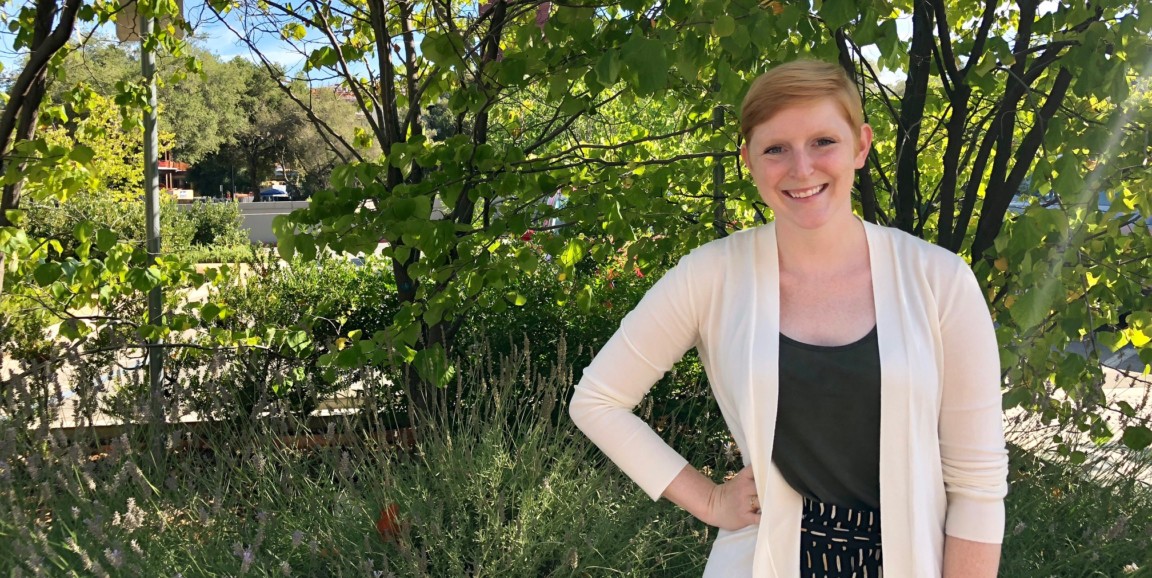As I sat down to chat with Kim Kinnear, who is wrapping up her first year in the master's program in Human Genetics and Genetic Counseling, her cheery demeanor stood out. Her kind and upbeat spirit was, she assured me, standard for what she called the "genetic counselor persona."
I asked her a few questions to learn more.
Where are you from?
I'm from Milwaukee, Wisconsin. I did my undergrad studies at the University of Wisconsin, Madison and majored in psychology and English.
How did you first get into science?
My dad was a biology major. My gifts from him growing up were things like rock tumblers and lab kits, so he fostered my interest in science from an early age.
What did you do before coming to Stanford?
I was working at an eating disorder residential facility as a therapist. My undergrad plan was to work for a year and then apply and get into PhD programs, but I ended up working there for six years -- I really loved it.
During that time I worked with patients, taking them through exposure therapy. During treatment, people were eating foods they were terrified of, which meant I got to eat a lot of crazy foods that were really fun for me.
Why did you come to Stanford?
I had lived in the Midwest my whole life but I always knew I wanted to live somewhere else. And really, how do you turn down Stanford? The program seemed wonderful and has been wonderful to me, so I know I made the right choice.
What is the genetic counseling program like?
We're a fairly small cohort of 11. I can't say enough about our supportive advising team, they're some of the most amazing people I've ever met. It's a very nurturing program with no competition.
What are you working on now?
I'm finishing my summer rotation, which is like a summer internship. I'm working at a cancer genetics clinic and counseling patients with either a family history of cancer, people recently diagnosed with certain cancers, or those diagnosed with cancer at young ages. I recommend genetic testing and talk through their results.
Did you always envision yourself becoming a genetic counselor?
No, I didn't even hear about genetic counseling until four or five years ago, when my dad was diagnosed with a heart condition. From there, I began online researching and cold emailing genetic counselors.
What is the most fulfilling about your work?
I think it's different in each speciality. For prenatal, for example, it's being able to reassure a family that their unborn child is going to be healthy, or counsel them if there is something wrong.
Do you have any advice to offer others who might be considering genetic counseling?
I think that in life, you don't have to follow the path that you think you have to.
I was pre-med in undergrad like so many other people. When I let that go to pursue psych, it was huge. Then I didn't get in to clinical psych programs. That was a huge failure for me at the time. Everything up until that point had always gone my way - it was one of the worst experiences. But now looking back it was one of the most helpful.
It allowed me to step back and think about what I really wanted to do. I want young students to know that there are so many things to look into in the medical field that don't require an MD.
What's something your colleagues don't know about you?
I started an a capella group in college.
How do you unwind?
I love to hike. Before my rotations I did a hiking and camping trip to Yosemite, King's Canyon, and Sequoia. I also love to travel.
What is your ultimate career goal?
I like to have multiple things going at once. I know I want to be a genetic counselor in pediatrics, but if I could have more than one specialty or get a doctorate and work as part of a training program, I'd love to do that.
Stars of Stanford Medicine features standout scholars in the School of Medicine.
Photo by Roxanne Ohayon




